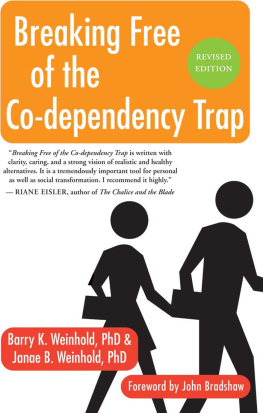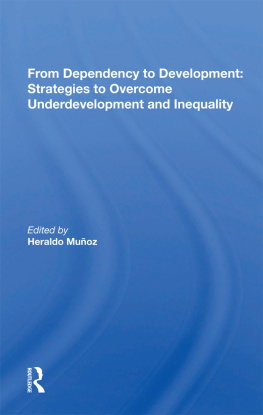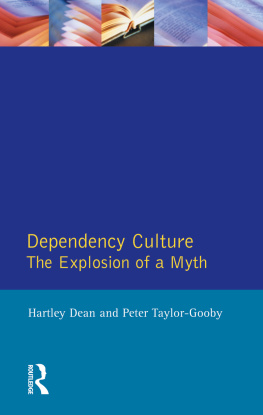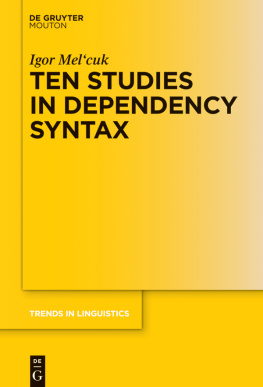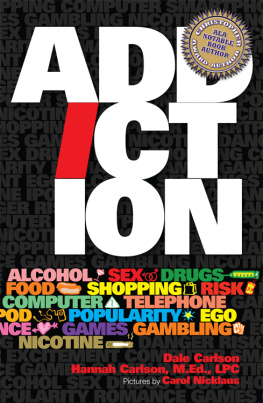
First published 1996 by Transaction Publishers
First paperback edition 1998
Published 2017 by Routledge
2 Park Square, Milton Park, Abingdon, Oxon 0X14 4RN
711 Third Avenue, New York, NY 10017, USA
Routledge is an imprint of the Taylor & Francis Group, an informa business
Copyright 1996 by Taylor & Francis
All rights reserved. No part of this book may be reprinted or reproduced or utilised in any form or by any electronic, mechanical, or other means, now known or hereafter invented, including photocopying and recording, or in any information storage or retrieval system, without permission in writing from the publishers.
Notice:
Product or corporate names may be trademarks or registered trademarks, and are used only for identification and explanation without intent to infringe.
Library of Congress Catalog Number: 95-37866
Library of Congress Cataloging-in-Publication Data
Rice, John Steadman.
A disease of ones own: psychotherapy, addiction, and the emergence of co-dependency / John Steadman Rice,
p. cm.
Includes bibliographical references and index.
ISBN 1-56000-241-7 (alk. paper)
1. CodependencySocial aspectsUnited States. 2. Popular culture United StatesHistory20th century. 3. United StatesCivilization1970- 4. Self-actualization (Psychology)Social aspectsUnited States. I. Title.
RC569.5.C63R5 1995
616.86dc20
95-37866
CIP
ISBN 13: 978-0-7658-0454-9 (pbk)
ISBN 13: 978-1-56000-241-3 (hbk)
Contents
Acknowledgments
This book began as a doctoral dissertation in the Department of Sociology at the University of Virginia. In the course of researching and writing that dissertation, I was at least doubly blessed to have worked with a group of first-rate sociologists who, as members of my advisory committee, accorded me the best possible combination of freedom and necessary guidance: James Davison Hunter, Gianfranco Poggi, and Mark Lupher from the University of Virginia and Robert Wuthnow from Princeton University.
My fellow graduate students at the University of Virginia were also consistent stalwarts, both as friends and as colleagues. Although all of the members of my cohort demonstrated a laudable interest in one anothers works, five in particularJames Hawdon, Robert Shea, James Tucker, Randy Atkins, and Daniel Stuhlsatzrepeatedly engaged me in challenging intellectual exchanges, playing devils advocate and critic at crucial moments and offering needed encouragement along the way. That, and their friendship, made both my time in Charlottesville and the work for this study immeasurably more enjoyable than it might otherwise have been.
I would also like to thank Jules Levine and Randy Canterbury, of the University of Virginias Medical Center and Addiction Sciences Center, respectively. Thanks are also due to Rick Gressard, Walter Mason, Marian Kyner, Steve Sayre, Mary Lynn Applegate, Sandy McKown, Nancy Evans, Sarah MacDonald, and Penny Norford.
Finally, but most important, I wish to thank the only people who lived through the entire project with me: my wife, Marla, and my daughter, Jesse Simone. Their love, patience, and support more than once made all the difference.
While all of the above made invaluable contributions to this research, I alone, of course, am responsible for this final version of it, and any oversights must be my responsibility.
The author gratefully acknowledges JAI Press for permisssion to reprint material previously published [in revised versions].
Sociological Quarterly, Discursive Formation, Life Stories, and the Emergence of Co-Dependency, vol.33, no.3, 1992:337-64.
Religion and the Social Order, The Therapeutic God: Transcendence and Identity in Two Twelve-Step Quasi-Religions. vol.4 (1994): 151-64.
Introduction
March 1991, 8:00 in the evening. In a small meeting room just off the administrative offices of the drug and alcohol treatment wing of a private hospital in suburban Los Angeles, a group of people sits in a circle listening to a man named Ken talk about himself.
My dad was just emotionally unavailable, and he was pretty much an abusive s.o.b. So, Im still pretty angry with him for his abusiveness and for not protecting me from other members of the family who were abusive. But, as a result I was overly- invested in mom, and thats shown up in my relationships with women. Im very co-dependent on women. But things have really started to improve with this program. Ive been in AA [Alcoholics Anonymous], too, for quite awhile, and in CoDA [Co-Dependents Anonymous] for a couple of years, and Ive been seeing a woman for awhile, now. Shes in AA, and working the program, and she says she loves me, which I believe is true.
Ken went on to explain to the group that, despite the positive changes in his life, he had recently fallen into old patterns of behavior. As he put it:
I got into some real co-dependent shit this week. My ex-wife called me a while back and left a message. One of those just wanted to be sure youre okay calls. And she left me her phone number on a piece of paper some time before that, which, characteristically, I hadnt thrown away, just in casewhich isnt too surprising, because I think I still love her. Anyway, I was going to return her call, and then I just decided that I had to go find her. Drove all the way up to where shes taking classesa couple of hours, I guessand I go running into the bursars office and tell them I have to fmd this student, and the lady said, well, we cant give that out. And I said, why? What do I look like? and she said, well, weve got all kinds of things, like ex-husbands, coming here, and we have to protect the students." I just felt so ashamed, and I kind of shrank down, shoved my hands in my pockets, mumbled a few words, and got the hell out of there. Never have called her back. But, even though that happened, Im still doing better than I was, and I can see that I still need to get some closure on these things, and get on with my life. Anyway, its good. This is good. I see a lot of recovery going on in here tonight, and Im just happy to be here. Thanks.
The other members of the group applauded, and one or two added, Thanks for sharing, Ken. The applause died down, and another person began to talk.
*****
Before the mid-1980s, neither the category of co-dependent nor CoDependents Anonymous (CoDA) groups like the one to which Ken told his story existed. But by die latter half of die 1980s and the early 1990s, Ken and his fellow co-dependents across the United States had engendered a veritable social movement, marked by hundreds of millions of dollars in book sales, frequent media attention, and the rapid formation of a wave of self-help groups styled after Alcoholics Anonymous.
The confessional talk show circuitOprah, Donahue, Geraldo, and the likeplayed an important role in these events, helping to spread word of this new discovery, co-dependency, across the popular cultural landscape. Throughout the latter 1980s, a handful of co-dependency experts made repeated appearances on such programs, touting their ideas and books, and offering commentary on the testimonials of the average Americans who usually appeared on the shows with them, serving as examples of co-dependent selves.
By providing a broad audience, programs such as Oprah can fan the flames of popular culture phenomena, but such shows in the main chronicle already existing cultural trends. Co-dependencys featured status on such programs followed on the heels of remarkable book sales and thus coincided with what all the evidence already suggested was a burgeoning popular interest. The first indication of this widespread public interest in co-dependency books was the dramatic success of Melody Beattie, an alcohol- and drug-addiction counselor and recovering alcoholic. Beatties


